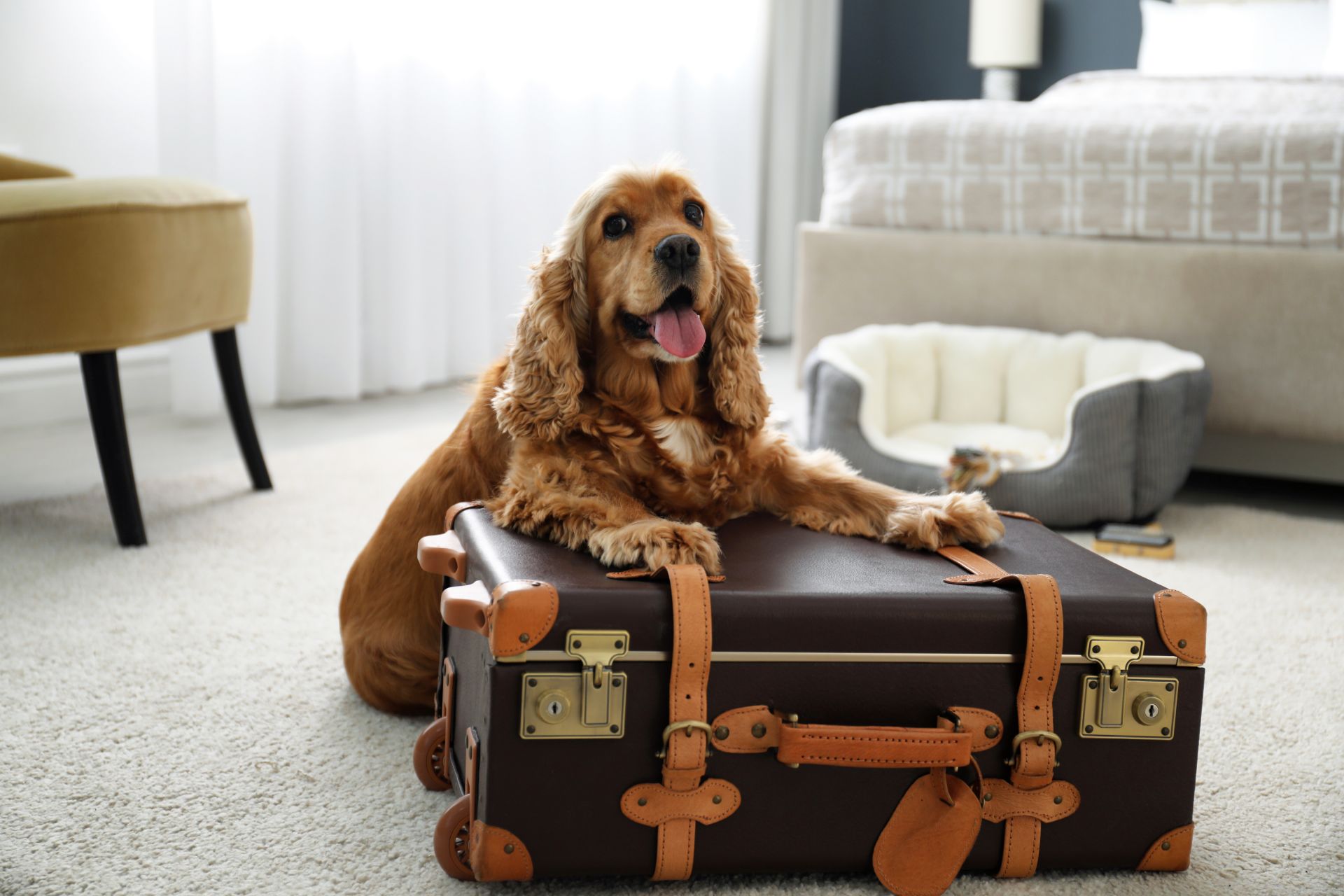While we at DFNZ love to promote taking your dog on holiday with you, we also know there are times when this is not possible. So, you’re faced with the daunting task of finding someone to look after your mate – scary right? Wrong! For once we’re not just talking dogs here either – whether you have a four-legged friend or one with two feet and feathers, you will want to read on. We’ll take a look at all the pet sitting options, their pros and cons, and what to ask before making your decision.

BOARDING ESTABLISHMENTS
We’ll start with the option that has been around for as long as we can remember – kennels and catteries. You may want to choose one in your local area, or take it as an opportunity to get your pet some wholesome country air – many boarding establishments are set rurally, which is great fun for a lot of dogs! The greatest upside of boarding facilities is that most staff members will have at least some basic dog training knowledge, so if your dog could do with a bit of a brush up while on holiday – this is a brilliant option. On top of that, they should provide enrichment games and activities such as agility to keep your dog’s mind stimulated. Who knows, your best mate may come back with a few tricks or a new skill under their collar!
Take your time finding the perfect place as some environments will be stressful for certain animals. You know your pet better than anyone, so if your pet dislikes daycare-style situations with lots of other animals, then boarding may not be the best choice. On the flip side, if they’re a social butterfly or visits daycare regularly then this could be a great opportunity for them to make new friends and enjoy their time playing with others. Always, always, visit a potential boarding facility before booking your pet in, so you can ask all the necessary questions and they can meet your furry friend before the big day.
If you’re looking to board a cat, again you will need to take into account your feline’s temperament before opting for a cattery. Most cats don’t like being removed from their regular environment, so being taken away from home and left to stay in a completely new place can be highly stressful.
If you do go down the route of boarding, it’s ultra-important to make sure your pet’s vaccinations are all up to date. Check in with your vet prior to your holiday and, to make sure your pet is protected against all diseases such as kennel cough and cat flu.

PET SITTERS
Pet sitting has become a popular choice in New Zealand and it’s easy to see why. Your pet can enjoy a lifestyle similar to what they are used to and in an environment similar to their own home. The great part is that you can opt for a sitter who will only have one animal at a time, if that is in the best interests of your pet. Similarly, if you have a cat and a dog, you can find a sitter who will take both – which may help ease your fur-babies into the situation a little better.
Some pet sitters will also come to your home, so your animals don’t need to go anywhere at all! This is a great option for cat owners, as well as those with timid, anxious or elderly dogs. Cats are happiest in their own environment and dogs are creatures of habit – so the less change to their daily routine, the better!
If you have a cat who doesn’t fret about being left overnight, you can even arrange a sitter to just pop by daily to feed, water and check on him. Part-time pet sitting is a more affordable option than a sitter staying at your property, and who knows, your feline friend may be happier having the extra space to himself!
You may be wondering how to find a pet sitter in your local region. Many work via word-of-mouth recommendations, so keep your ears peeled when at your local dog park or you can ask your vet for recommendations. It’s also worth checking out Pawshake, a pet sitting directory specially created for finding verified, vetted sitters. They have an easy-to-use mobile app and a simple 3-step booking process – what more could you want!

FRIEND/FAMILY MEMBER
Friends or family members are also a great choice to entrust your fur-babies with, as they likely know your pets almost as well as you do! We’re not judging, we all talk about our pets every chance we get!
If your pets are familiar with this person too, it can make the experience far less stressful for them – it’s just like going for a sleepover at a friend’s place!
If you do choose to leave your pet with someone you know, just be sure they have a lifestyle similar to your own. We’re talking about factors like kids, work commitments etc. If your pet isn’t used to young children, then don’t leave them with someone who has a toddler. Likewise, if your dog is used to going to work with you every day, think twice about asking a friend who works 10 hours a day to take care of your furry friend.
For dog owners, the other factor to consider if your dog will be staying at your friend’s home, is whether or not their property is fully fenced. If they are not already a pet owner, they may not have the house dog-proofed. For an older dog that is content lounging and being taken out on a lead to toilet this may be satisfactory, but for younger, active dogs this could potentially pose a real problem. Make sure you take this into consideration when choosing a friend or family member to look after your best mate.

QUESTIONS TO ASK & FACTORS TO CONSIDER
When vetting a potential boarding facility or pet sitting agency you don’t already know, we’ve put together a handy set of questions to ask and factors to consider. Not all of these will be relevant to your pet or situation, but we believe they’ll cover all bases so you can rest assured you are leaving your beloved pet in the right hands. If the property is unfamiliar, be sure to visit and see it for yourself before dropping your pet off for the first time.
- Do they have an up to date registration? (Applicable for boarding facilities/pet sitting agencies)
- Are the facilities clean, dry, draught-free, secure and do they provide shade?
- Do they keep large and small dogs separate?
- Will they exercise your pet and give them the space they need to act normally?
- Will they spend time with your pet each day and give them the social contact they need?
- How will they monitor your pet’s medication?
- Do they have a suitable system to monitor pets in the day and evening? (Applicable for boarding facilities)
- Are predator and prey species kept separately to prevent stress? (Applicable for combined boarding facilities)
- Do they require proof of vaccination from all animals that stay with them?
- How many staff do they have – are there enough to look after all of the animals? (Applicable for boarding facilities)
- Have they asked about your pet’s diet and health? They should be forthright with this question themselves.
- Can they accommodate for any medical issues your pet has while you’re away? Do you have a trusted vet on call?
- Will they feed your pet their own food? This is a very important factor to consider – your pet should continue their own diet as per usual while in the care of someone else.
- Do they require all pets that stay with them to be up to date with flea and worm treatments?
- Do they have good reviews online or through word of mouth? If they are a large pet sitting agency/boarding facility we recommend doing thorough research online and read past reviews and articles.
- Lastly, do you feel welcome and do the animals in their care look clean, happy and healthy?

PACKING YOUR PET’S SUITCASE
Just like you, your pet will need a bag packed with the essentials for their holiday as well – and no one likes that feeling of forgetting something important!
What to pack:
- An overnight bag to keep all items together – you can’t risk losing your pet’s favourite toy!
- Vet book and vaccination certificates
- Your vet’s contact details
- Details of your pet insurance company and policy number
- Two food/water bowls
- Collar, harness and leash
- Any required medication or supplements (you could even split these into pillboxes to make it even easier for your sitter)
- Enough food plus a little extra just in case (don’t forget to include instructions on how much to feed and how often)
- Blankets (if your pet is timid or anxious, you could substitute these for your own sweaters/blankets that smell like you)
- Their usual pet bed (try to keep things as normal as possible!)
- Crate (if your pet is crate trained, this can be helpful in a sitter’s home to create a safe, familiar space)
- A couple of their favourite toys or scratch posts (don’t forget their ball launcher or frisbee for active dogs!)
- If your pet wears sweaters in the colder months, don’t forget a couple of layers and their raincoat
- Treats if your dog is used to being given these on walks or during the day
- If your dog has been undergoing training, make sure to leave your trainer’s details in case your pet sitter needs any help or has any questions while you are away.
- Information about your pet’s behaviour and personality including their likes and dislikes
- Details about how and when to exercise them
The most important thing to take into consideration is your gut feeling. Whichever option you decide to go with, follow your instinct and if it doesn’t feel right, keep looking for something more suitable. It’s your pet’s welfare you are handing over to someone else, so we cannot stress this enough! Make sure you get some extra bonding time in with your pet before you depart, as the calmer you are about the situation, the calmer they will be in turn! If it makes you feel any better – think of it as a holiday for your pet as well, we’re sure they’ll be treated like royalty in your absence!
Brought to you by Southern Cross Pet Insurance.
For pet friendly accommodation and services, download the Dog Friendly New Zealand mobile app. Click here to start.
